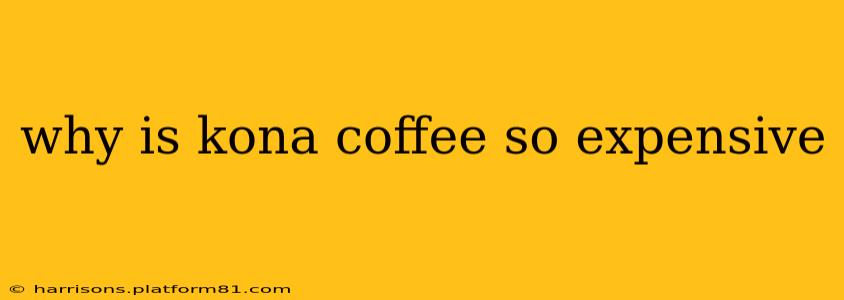Kona coffee, grown on the slopes of the volcanic Hualālai mountain on the Big Island of Hawai'i, enjoys a reputation as one of the world's most premium coffees. But its high price tag often leaves consumers wondering: why is Kona coffee so expensive? The answer isn't simple and involves a complex interplay of factors, from its unique terroir to the meticulous hand-harvesting process.
What Makes Kona Coffee Unique?
The exceptional quality and consequently high price of Kona coffee stem from several key elements:
-
Terroir: Kona's volcanic soil, abundant rainfall, and unique microclimates create an ideal environment for cultivating Arabica coffee beans. The rich volcanic soil provides essential nutrients, while the varying altitudes and rainfall patterns influence the beans' flavor profiles, resulting in a complex and nuanced cup. This specific terroir is difficult to replicate elsewhere, contributing to Kona's exclusivity.
-
Hand-Harvesting: Unlike many coffee farms that utilize machinery, Kona coffee is almost exclusively hand-picked. This labor-intensive process ensures only ripe, high-quality cherries are selected, eliminating unripe or damaged beans that could compromise the final product's flavor. The meticulous nature of hand-harvesting significantly increases the cost of production.
-
Strict Regulations: The Kona Coffee Farmers Association (KCFA) maintains strict standards and regulations for labeling Kona coffee. This ensures authenticity and protects the reputation of the region's coffee. Only coffee beans grown within a designated area of the Big Island can be labeled as "Kona." This strict quality control adds to the overall cost.
-
Limited Production: The area suitable for Kona coffee cultivation is relatively small, limiting the overall production volume. This scarcity further drives up the price, as demand consistently outpaces supply. The delicate balance of environmental factors and limited land availability naturally restricts the amount of Kona coffee produced each year.
-
Processing & Export: The processing of Kona coffee beans, from washing and drying to roasting and packaging, is often done with a focus on preserving the delicate flavors. These additional steps add to the overall production cost and the final price the consumer pays. The cost of exporting the beans to international markets also contributes to the higher price.
How Does Kona Coffee Compare to Other Coffees?
Kona coffee's higher price point is justified by its superior quality, unique characteristics, and the meticulous care involved in its production. While other high-quality coffees exist globally, few can match Kona's distinct flavor profile and the overall commitment to quality that underpins its production.
Is Kona Coffee Worth the Price?
Whether or not Kona coffee is "worth" the price is a subjective question depending on individual preferences and budgets. For coffee connoisseurs who appreciate nuanced flavor profiles and a commitment to quality and sustainability, the higher price tag is often seen as justified. The distinct taste and the story behind its cultivation make it a special treat.
What are the Different Grades of Kona Coffee?
While there isn't an official grading system like with some other coffees, the quality of Kona coffee can vary based on the farm, processing methods, and bean characteristics. Generally, higher-quality Kona coffee will have a more complex flavor profile and a smoother texture. Look for reputable roasters and brands to ensure you're getting a high-quality product.
How Can I Tell if Kona Coffee is Authentic?
Because of its high price, there are unfortunately many counterfeit Kona coffees on the market. The best way to ensure authenticity is to buy from reputable roasters, check for the KCFA seal, and look for coffee that specifically states its origin on the Big Island.
In conclusion, the high price of Kona coffee reflects a combination of factors: its unique terroir, labor-intensive hand-harvesting, strict quality control, limited production, and the overall dedication to producing a superior cup. While expensive, its unique qualities and reputation attract connoisseurs worldwide, making it a sought-after and premium coffee experience.
